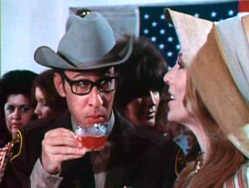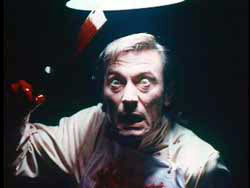Welcome to Arrow Beach (1974) from Johnny Web (Uncle Scoopy; Greg Wroblewski) |
|
Here's a good tip for you drifters. If a stranger offers you his
hospitality by saying he'd like to have you for dinner, make sure you
clear up the inherent ambiguity of his invitation. Especially if he
looks like Laurence Harvey. That is precisely the lesson learned by a hippie drifter named Robin (Meg Foster), who accepts a dinner invitation from ol' Larry before she discovers that when he says he eats chicks, he doesn't mean small chickens, and he's not making a reference to oral sex. It turns out that Larry served in Korea and he was forced into a situation where he had to eat human flesh to survive, and he just really developed a craving for "long pork," especially of the female variety, and particularly with a light mustard/tarragon. Chicks - the other white meat! Larry really gets into gourmet cannibalism, and even entices his spooky sister to keep the secret that his favorite dish is "Drifter Dijon." Poor Meg Foster accepts an invitation to stay the night at Casa de Larry without seeing any of the the warning signs in advance, although some of them seemed kind of obvious, like Larry's sister telling her to lock her door, and mainly the human heads on the wall in the trophy room. Hey, c'mon, I keed. Larry was actually a nice guy. In fact, he lived to serve women. Especially with Beaujolais. Meg finally figures things out when she wanders around the house at night and sees ol' Larry chopping up a human corpse with a meat cleaver. She barely manages to run away and share her story with the local gendarmerie, but they simply won't take the word of a homeless hippie chick when she's pitted up against the solemn authority and gravitas exuded by a local war hero. So she has to ... (is your guess locked in?) ... take the law into her own hands. By acting in and directing the film, Laurence Harvey became the Orson Welles of cannibal films! Unfortunately for Larry's memory, he passed away from this world in between the time that the film was "completed" (I use that word hesitantly) and the release date, thus assuring that Arrow Beach would be remembered as his final contribution to the dominant art-form of the 20th century. It also comprises half of his career directorial output because he directed only one other film, an equally obscure 1963 offering called The Ceremony. |
||
 |
Harvey's acting in the film is predictably intense and haunted and joyless (right), as you might expect from a man playing a tragic cannibal while he himself was dying of cancer, but that was just typical grade-B stuff, and would not serve to make the film especially memorable. His direction is what makes the film really shine with incompetence. The musical score, for example, is non-stop elevator music, capped off by a Lou Rawls love ballad which is crooned in the performer's characteristically mellow style over the opening and closing credits. If that weren't enough to destroy the tone of a cannibal film, there's also the standard comic relief that can only be provided by a wacky incompetent deputy doing a Woody Allen impersonation (left)! |
 |
|
The film also has a lot of problems that were probably derived directly from Harvey's terminal illness. The second half of the movie focuses on a detective who is trying to bring the cannibal to justice, and that story is just dropped and forgotten, as if Harvey had been too sick to keep shooting. In fact, that probably is the explanation, because Harvey was even too sick to play the climactic confrontational scene with the avenging hippie. That scene was performed by a double, despite the fact that the double's face is in some shots, confusingly enough! Harvey was also too sick to work with the editor on the final cut, and he made his suggestions telephonically from his deathbed, without actually seeing the results. The film's greatest problem, however, had nothing to do with the lack of continuity and the inconsistent tone. You may ask, "What could be worse than that?" Well, I'll tell you. Except for a couple of gory scenes, this film is all talk, and it's not just the usual expository dialogue which low-budget movies have to substitute for pictorialization. ("Oh, my God! Look, the monster's eating a car!") It has that, but it also has endless philosophizing and debate about such topics as why youths were so aimless in that time, why we need to treat our war veterans better, and other such completely sincere and utterly boring matters which would be more appropriately discussed on Meet the Press than in a movie in which the characters press the meat. The incompetence of the film makes it unappealing to mainstream audiences, and the inexplicitness makes it too tame for aficionados of the Italian Cannibal Movie genre. That means that the only possible audience for the film consists of bad movie lovers. Arrow Beach does have some tasty moments which will bring a smile to that cynical crowd, but in general it's too verbose and just too damned boring to provide the proper bad movie vibe. On the other hand, if MST3K ever comes back with an R-rated cable show, Arrow Beach should be one of their first endeavors, because this would be a great one to watch with Mike and the bots. |
||
|
||||
|
||||
